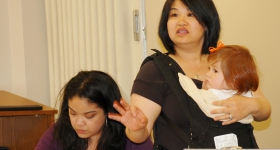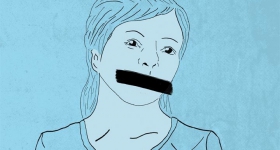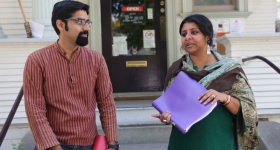A packed coach pulls off a Chinatown sidewalk, away from a smiling woman holding a wad of $20s. The driver, speeding down 1-95, speaks little English and turns up the volume on the Jackie Chan movie blaring throughout the cabin. A diverse group of passengers talk loudly on their cell phones while others turn up the volume on their iPods to drown out the yelling. But after paying only $15 a ticket for a 200-mile ride, who can complain?
Started as a means to shuttle Chinese restaurant workers between Boston and New York Chinatowns, transportation companies collectively known as the Chinatown buses have become popular travel alternatives among Asians and non-Asians alike, and in particular, students on a budget.
Lacking any sort of publicity or advertising campaigns, Chinatown bus companies are fueled primarily by word of mouth, and their operations are informal. Tickets are sold on the street, in walkup windows or in nearby Chinese restaurants and bakeries. While Greyhound passengers leave from the Port Authority Bus Terminal in midtown Manhattan, long lines of Fung Wah riders board in the shadow of the Manhattan Bridge in Chinatown. You can pick up a pork bun snack before you leave New York and dine on hand-rolled fried noodles when you arrive in Washington, D.C.'s Chinatown a few hours later.
Fung Wah Bus Transportation Inc. led the pack with its shuttle service to Boston in 1998, and Sunshine Travel and Travel Pack began to run that route soon after. Dragon Coach and New Century dominated the bus lines running between New York and Washington. Today, increased demand has fueled more than 30 bus lines in the Northeast competing for fares between New York, Philadelphia, Boston, and Washington, as well as Rhode Island, Michigan, Ohio, Virginia, and-for sun seekers blessed with infinite patience and steel kidneys-Florida.
IN THE BUS WE TRUST
Competition became so fierce that shootings, stabbings, a decapitation and a man being crushed between two buses reportedly resulted from Chinatown bus rivalries. Rumors spread that Chinese gangs were involved. But such news has since quieted, and cheap, convenient service appears to have outweighed the occasional report of a speeding bus overturning.
"I've never felt unsafe on a Chinatown bus," says Alice Chen, a 29-year-old equity trader in New York. "I remember the blackout in the summer of 2003. I needed to get to Rhode Island the next day for a wedding, and, sure enough, the Chinatown buses were running smoothly."
"The buses are cheap and fast-sometimes too fast," says Holly Lung, a community service worker in New York's Chinatown. "If I took Greyhound, I would have had to wait in line to buy tickets, then stay at the underground terminals with their unpleasant odors. It would mean two hours of queue time. The Chinatown buses are quick, which works for the New York type of lifestyle."
But they're not always reliable or on time. Lung's trips to Baltimore were cheaper than driving-$20 roundtrip compared with $40 for tolls and $50 for gasbut sometimes her bus, already packed with passengers bound for Washington, would skip Baltimore and leave her stranded and waiting for the next bus.
Everyone has a Chinatown bus horror story, but many riders feel it's all part of the adventure, and what else do you expect for such low fares?
"Bus rides are always gross, cramped, and filled with odd people, so why not pay less than on Greyhound or Peter Pan?" says Rachel Skerritt, a 29-yearold African American novelist from Boston who rides the Chinatown busses.
Just as discount airlines have transformed the airline industry, the competition created by Chinatown buses has lowered prices and increased demand for coach service. Approximately 350 Chinatown buses depart New York each week. One-way tickets to Boston cost about $15, to Washington $20 and to Philadelphia merely $12. Fung Wah made a name for itself with a $10 one-way ticket on its New York-Boston route after price wars among Chinatown bus companies. Major mainstream companies like Greyhound and Peter Pan responded by cutting ticket prices to $35.
Financially, it's a wonder the Chinatown buses survive. Pei Lin Liang, owner of Fung Wah, told the New York Times that the New York-to-Boston roundtrip has operating costs of $800, including driver's salary, insurance, fuel, tolls and maintenance. If a 57-passenger bus is fully booked, revenues per round trip are $1,140, yielding a profit of $340.
But while Chinatown bus profit margins are low, volume is high and costs are lower, which allows them to challenge established players.
"The Chinatown buses seem to have discovered that the big player, Greyhound, has a less flexible business model, which limits how effectively it can respond to them," says Adam Brandenburger, strategy professor at New York University's Stern School of Business.
And the Chinatown buses continue to make themselves more competitive. In the past few years, many have added websites with schedules and online ticketing. Meanwhile, other ethnic bus operations are getting in on the action in New York, including Vamoose and Washington Deluxe, which are both run by Hasidic Jews and observe the Sabbath with no routes on Friday nights or Saturdays.
THE LAW COMES TO CHINATOWN
With the Chinatown buses' success, however, has come increased scrutiny from regulatory agencies about their safety. Concerns range from the mundane-meeting requirements for insurance, maintenance and driver licensing-to highway accidents and discrimination against riders in wheelchairs.
In 2005, a Travel Pack bus burst into flames en route to Boston. Passengers said the driver, who had a record of license suspensions due to speeding, had been stepping on it despite a flat tire. In 2006, a Shun Fa bus from Pittsburgh to New York lost control during a thunderstorm and crashed into the highway meridian and went up an embankment. The front of the bus was torn off, and one passenger was hospitalized. A Fung Wah bus going to Boston flipped over in 2006, injuring 34.
The major bus companies were none too happy about the Chinatown buses' popularity either. Peter Pan claimed that Fung Wah cut costs by operating illegally on the streets of Boston, leading to closer scrutiny by city regulators. Fung Wah has stopped picking people up on the streets and operates at the South Station terminal alongside the big companies.
A confusing plethora of federal and state agencies regulate these buses. The Federal Highway Administration licenses the buses for the routes. State agencies are responsible for inspecting commercial bus fleets for safety, but the Federal Motor Carrier and Safety Administration enforces safety regulations and keeps records on accident history. These agencies have complained that it's tough to enforce rules for curbside operators that lack a home base or fixed maintenance facility.
The result is that, like many operations in Chinatowns, the buses fall outside the purview of the law while operating in fullview of authorities-for now.
According to Peter Kwong, Asian American Studies professor at New York City's Hunter College, "It's only a matter of time before these buses will be regulated. It's the historical process of competition for regulation to occur for newly emerging businesses. This happened with the banking, aviation and pharmaceutical industries, and is happening with hedge funds more recently."
The originally-underground economy has grown so prevalent that the publicperhaps soon-to-be-followed by legislators-can't ignore its skirting of the rules.
"The Chinatown buses are giving very credible competition to Greyhound," Kwong said. "They have the right to survive as long as they play within the rules, but people shouldn't tolerate safety problems, and the Chinatown buses-although started by immigrants in one ethnic community-should be treated as other legitimate businesses."
If this happens, the intrepid thrill of trekking down a Chinatown alley to score a bus ride for little more than the price of a Happy Meal will become a bygone relic of Chinese Americana.
Additional reporting by Althea Chang.
Gena Kiu is a journalist living in New York City. A recent graduate from New York University's Stern School of Business, she is also a board member with the Coalition for Asian American Children and Families.









Comments